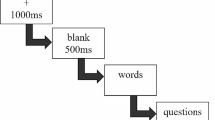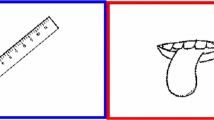Abstract
Previous research on language switching has debated whether high-proficient bilinguals exhibit symmetrical costs and one underlying reason for which may be the potential influence of cross-linguistic characteristics. The previous conflicting findings suggest their impact on language switching needs to be further investigated. In this study, we recruited 36 high-proficient Chinese–English bilinguals and investigated the effect of cross-linguistic similarity on the switching of quantifier expressions under three switch conditions. The results showed that switch costs were significantly greater when the quantifier expression was similar between Chinese and English than when it was different. Larger switch costs were found in the alternate switch condition than those in the non-switch or random switch conditions. In addition, participants exhibited larger switch costs when switching to the first language than when switching to the second language. The results suggest that the similarity of quantifier expressions between the first language and the second language would create more competition and thus induce larger switch costs in phrase-level language switching, which may be derived from the inner word recognition system of the mental lexicon. This study further improves the relevant theories on the origin of switch costs by supporting the Language Non-Specific Selection Hypothesis.




Similar content being viewed by others
References
Abutalebi J, Green DW (2016) Neuroimaging of language control in bilinguals: neural adaptation and reserve. Biling Lang Cogn 19(4):689–698
Abutalebi J, Della Rosa PA, Ding G, Weekes B, Costa A, Green DW (2013) Language proficiency modulates the engagement of cognitive control areas in multilinguals. Cortex 493:905–911
Ahn D, Ferreira VS, Gollan TH (2021) Selective activation of language specific structural representations: Evidence from extended picture-word interference. J Mem Lang 120:104249
Baldi P, Cuzzolin P (2018) Indo-European languages. In: Comrie B (ed) The world’s major languages. Routledge, pp 41–513
Bosma E, Pablos L (2020) Switching direction modulates the engagement of cognitive control in bilingual reading comprehension: an ERP study. J Neurolinguistics 55:100894
Bultena S, Dijkstra T, van Hell JG (2015) Switch costs modulations in bilingual sentence processing: evidence from shadowing. Lang Cogn Neurosci 30(5):586–605
Calabria M, Hernandez M, Branzi FM, Costa A (2012) Qualitative differences between bilingual language control and executive control: evidence from task-switching. Front Psychol 3:399
Chen M, Ma FY, Wu JJ et al (2020) Individual differences in language proficiency shape the neural plasticity of language control in bilingual language production. J Neurolinguistics. https://doi.org/10.1016/j.jneuroling.2020.100887
Cheng LLS (2009) On every type of quantificational expression in Chinese. In: Monika R, Anastasia G (eds) Quantification, definiteness, and nominalization. Oxford University Press, Oxford, pp 53–75
Christoffels IK, Firk C, Schiller NO (2007) Bilingual language control: an event-related brain potential study. Brain Res 1147:192–208
Costa A, Santesteban M (2004) Lexical access in bilingual speech production: evidence from language switching in highly proficient bilinguals and L2 learners. J Mem Lang 50(4):491–511
Costa A, Santesteban M, Ivanova I (2006) How do highly proficient bilinguals control their lexicalization process? Inhibitory and language-specific selection mechanisms are both functional. J Exp Psychol Learn Mem Cogn 32:1057–1074
Cui ZL, Shen XB (2016) The effects of language similarity on bilinguals' speech production. In: Proceedings of 2016 international conference on audio, language and image processing (Icalip), 487–493
DeBruin AD, Roelofs A, Dijkstra T, Fitzpatrick I (2014) Domain-general inhibition areas of the brain are involved in language switching: fMRI evidence from trilingual speakers. Neuroimage 90(8):348–359
Declerck M, Philipp AM (2015) A sentence to remember: instructed language switching in sentence production. Cognition 137:166–173
Deravi F (2009) Language non-specific selection in highly proficient bilinguals. Acquis Interact Lang Étrangère (Aile Lia) 2:131–163
Dorota G, Bailleul O, Werner AM, Quick AE (2021) A crosslinguistic study of child code-switching within the noun phrase: a usage-based perspective. Languages 6(1):29
Duan J, Jiang M (2021) An ERP study of codeswitching effect in lexical processing of proficient Chinese-English bilinguals. J PLA Univ Foreign Lang 44(01):27–35
Feiman R, Snedeker J (2016) The logic in language: how all quantifiers are alike, but each quantifier is different. Cogn Psychol 87:29–52
Gao L, Gao X, Bai X, Chen M, Guo Z (2018) Language switching and switching cost in language comprehension of Tibetan-Chinese bilinguals with different proficiency levels. Stud Psychol Behav 16(06):744–750
Garcia PB, Leibold L, Buss E, Calandruccio L, Rodriguez B (2018) Code-switching in highly proficient Spanish/English bilingual adults: impact on masked word recognition. J Speech Lang Hear Res 61(9):2353–2363
Grainger J, Beauvillain C (1987) Language blocking and lexical access in bilinguals. Q J Exp Psychol 39A:295–319
Green DW (1998) Mental control of the bilingual lexico-semantic system. Biling Lang Cogn 1(2):67–81
Green DW, Abutalebi J (2013) Language control in bilinguals: the adaptive control hypothesis. J Cogn Psychol 25(5):515–530
Kheder S, Kaan E (2019) Lexical selection, cross-language interaction, and switch costs in habitually codeswitching bilinguals. Biling Lang Cogn 22(3):569–589
Kumar T, Nukapangu V, Hassan A (2021) Effectiveness of code-switching in language classroom in India at primary level: a case of L2 teachers’ perspectives. Pegem Egitim Ve Ogretim Dergisi 11(4):379–385
Litcofsky KA, Van Hell JG (2017) Switching direction affects switching costs: behavioral, ERP and time frequency analyses of intra-sentential codeswitching. Neuropsychologia 97:112–139
Liu X, He C, Chen J, Deng Q (2015) The bilingual cognitive control mechanism of highly proficient Cantonese-Mandarin speakers: evidence from a dual-task switching paradigm. Acta Psychol Sin 47(4):439–454
Liu H, Liang L, Dunlap S, Fan N, Chen B (2016) The effect of domain-general inhibition-related training on language switching: an ERP study. Cognition 146:264–276
Liu H, Dunlap S, Liang L, Chen B (2018a) The effect of inhibitory control and its training on L1 and a new learned language switching. Int J Biling 22(6):653–674
Liu H, Xie N, Zhang M, Gao X, Dunlap S, Chen B (2018b) The electrophysiological mechanism of joint language switching: evidence from simultaneous production and comprehension. J Neurolinguistics 45:45–59
López-Penadés R, Sanchez-Azanza VA, Aguilar-Mediavilla E, Buil-Legaz L, Adrover-Roig D (2020) Associations of natural language switching with executive control in early bilinguals. Biling Lang Cogn 23:1008–1019
Ma F, Li S, Guo T (2016) Reactive and proactive control in bilingual word production: an investigation of influential factors. J Mem Lang 86:35–59
Meuter RF, Allport A (1999) Bilingual language switching in naming: asymmetrical costs of language selection. J Mem Lang 40(1):25–40
Meykadeh A, Golfam A, Batouli SAH et al (2021) Overlapping but language-specific mechanisms in morphosyntactic processing in highly competent L2 acquired at school entry: fMRI evidence from an alternating language switching task. Front Hum Neurosci 15:728549
Peeters D, Runnqvist E, Bertrand D, Grainger J (2014) Asymmetrical switch costs in bilingual language production induced by reading words. J Exp Psychol Learn Mem Cogn 40(1):284–292
Runnqvist E, Strijkers K, Alario F, Costa A (2012) Cumulative semantic interference is blind to language: implications for models of bilingual speech production. J Mem Lang 66(4):850–869
Singh N, Mishra R (2014) The modulatory role of second language proficiency on performance monitoring: evidence from a saccadic countermanding task in high and low proficient bilinguals. Front Psychol 5:1481
Snodgrass JG, Vanderwart M (1980) Standardized set of 260 pictures—norms for name agreement, image agreement, familiarity, and visual complexity. J Exp Psychol Hum Learn Memory 6(2):174–215
Subich VG, Mingazova NG, Al-foadi RA (2018) Structure and functions of quantifier words (in English, Russian and Japanese). Rev Publicando 5(18):33–39
Tarlowski A, Wodniecka Z, Marzecová A (2013) Language switching in the production of phrases. J Psycholinguist Res 42(2):103–118
Timmer K, Calabria M, Costa A (2019) Non-linguistic effects of language switching training. Cognition 182:14–24
Vorwerg CC, Suntharam S, Morand MA (2019) Language control and lexical access in diglossic speech production: evidence from variety switching in speakers of Swiss German. J Mem Lang 107:40–53
Zhang NN (2013) Classifier structures in Mandarin Chinese. Walter de Gruyter
Zhang JJ, Wang Y (2012) The proficient Chinese-English bilinguals’ mechanism of language switching in phrase level. Acta Psychol Sin 44(2):166–178
Funding
This study was funded by General Project of Social Science Planning in Shanghai (2017BYY002).
Author information
Authors and Affiliations
Corresponding author
Ethics declarations
Conflict of interest
The authors declare that they have no conflict of interest.
Ethical approval
This study complies with the Declaration of Helsinki.
Informed consent
The verbal consent was approved by the ethics committee.
Additional information
Publisher's Note
Springer Nature remains neutral with regard to jurisdictional claims in published maps and institutional affiliations.
Editor: Gladys Nyarko Ansah (University of Ghana), Aine Ito (National University of Singapore); Reviewers: Fusheini Angulu Hudu (University of Ghana), Evershed Amuzu (University of Ghana).
Rights and permissions
Springer Nature or its licensor (e.g. a society or other partner) holds exclusive rights to this article under a publishing agreement with the author(s) or other rightsholder(s); author self-archiving of the accepted manuscript version of this article is solely governed by the terms of such publishing agreement and applicable law.
About this article
Cite this article
Chang, X., Huang, Xy., Zou, Xz. et al. The effects of cross-linguistic similarity on phrase-level language switching: evidence from high-proficient Chinese–English bilinguals. Cogn Process 24, 415–424 (2023). https://doi.org/10.1007/s10339-023-01137-1
Received:
Accepted:
Published:
Issue Date:
DOI: https://doi.org/10.1007/s10339-023-01137-1




